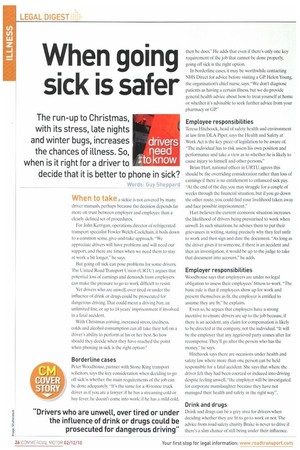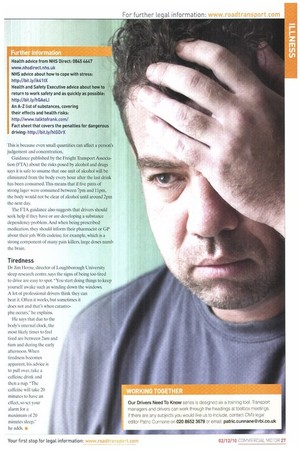When going sick is safer
Page 26

Page 27

If you've noticed an error in this article please click here to report it so we can fix it.
drivers need tto know
The run-up to Christmas, with its stress, late nights and winter bugs, increases the chances of illness. So, when is it right for a driver to decide that it is better to phone in sick?
Words: Guy Sheppard When to take a sickie is not covered by many driver manuals, perhaps because the decision depends far more on trust between employer and employee than a clearly defined set of procedures, For John Kerrigan, operations director of refrigerated transport specialist Fowler Welch-Coolchain, it boils down to a common sense, give-and-take approach. -We appreciate drivers will have problems and will need our support, and there are times when we need them to stay at work a bit longer," he says
But going off sick can pose problems for some drivers. The United Road Transport Union (URTU) argues that potential loss of earnings and demands from employers can make the pressure to go to work difficult to resist.
Yet drivers who are unwell, over-tired or under the influence of drink or drugs could be prosecuted for dangerous driving. That could mean a driving ban, an unlimited fine, or up to 14 years' imprisonment if involved in a fatal accident.
With Christmas coming, increased stress, tiredness, colds and alcohol consumption can all take their toll on a driver's ability to perform at his or her best. So how should they decide when they have reached the point when phoning in sick is the right option?
Borderline cases
Peter Woodhouse, partner with Stone King transport solicitors, says the key consideration when deciding to go off sick is whether the main requirements of the job can be done adequately. "It's the same for a 40-tonne truck driver as if you are a lawyer: if he has a streaming cold or hay fever, he doesn't come into work: if he has a mild cold, then he does." He adds that even if there's only one key requirement of the job that cannot be done properly, going off sick is the right option.
In borderline cases, it may be worthwhile contacting NHS Direct for advice before visiting a GP. Helen Young, the organisation's chief nurse, says: "We don't diagnose patients as having a certain illness, but we do provide general health advice about how to treat yourself at home or whether it's advisable to seek further advice from your pharmacy or GP."
Employee responsibilities
Teresa Hitchcock, head of safety health and environment at law firm DLA Piper, says the Health and Safety at Work Act is the key piece of legislation to be aware of. "The individual has to risk assess his own position and performance and take a view as to whether he is likely to cause injury to himself and other persons."
Brian Hart, national officer in URTU, agrees this should be the overriding consideration rather than loss of earnings if there is no entitlement to enhanced sick pay. "At the end of the day, you may struggle for a couple of weeks through the financial situation, but if you go down the other route, you could find your livelihood taken away and face possible imprisonment."
Hart believes the current economic situation increases the likelihood of drivers being pressurised to work when unwell. In such situations, he advises them to put their grievances in writing, stating precisely why they feel unfit to work and then sign and date the document. "As long as the driver gives it to someone, if there is an accident and then an investigation, it would be up to the judge to take that document into account," he adds
Employer responsibilities
Woodhouse says that employers are under no legal obligation to assess their employees' fitness to work. "The basic rule is that if employees show up for work and present themselves as fit, the employer is entitled to assume they are fit," he explains Even so, he argues that employers have a strong incentive to ensure drivers are up to the job because, if there is an accident, any claim for compensation is likely to be directed at the company, not the individual. "It will be the employer that any aggrieved party comes after for recompense. They'll go after the person who has the money," he says.
Hitchcock says there are occasions under health and safety law where more than one person can be held responsible for a fatal accident. She says that where the driver felt they had been coerced or induced into driving despite feeling unwell, "the employer will be investigated for corporate manslaughter because they have not managed their health and safety in the right way".
Drink and drugs
Drink and drugs can be a grey area for drivers when deciding whether they are fit to go to work or not. The advice from road safety charity Brake is never to drive if there's a slim chance of still being under their influence. This is because even small quantities can affect a person's judgement and concentration, Guidance published by the Freight Transport Association (FM) about the risks posed by alcohol and drugs says it is safe to assume that one unit of alcohol will he eliminated from the body every hour after the last drink has been consumed. This means that if five pints of strong lager were consumed between 7pm and llpm, the body would not be clear of alcohol until around 2prn the next day.
The FTA guidance also suggests that drivers should seek help if they have or are developing a substance dependency problem. And when being prescribed medication, they should inform their pharmacist or GP about their job. With codeine, for example, which is a strong component of many pain killers, large doses numb the brain.
Tiredness
Dr Jim I lorne, director of Loughborough University sleep research centre, says the signs of being too tired to drive are easy to spot. "You start doing things to keep yourself awake such as winding down the windows. A lot of professional drivers think they can beat it. Often it works, but sometimes it does not and that's when catastrophe occurs,he explains.
Fle says that due to the body's internal clock, the most likely times to feel tired are between 2am and 6am and during the early afternoon. When tiredness becomes apparent, his advice is to pull over, take a caffeine drink and then a nap. "The caffeine will take 20 minutes to have an effect, so set your alarm for a maximum of 20 minutes sleep." he adds. it
































































































































